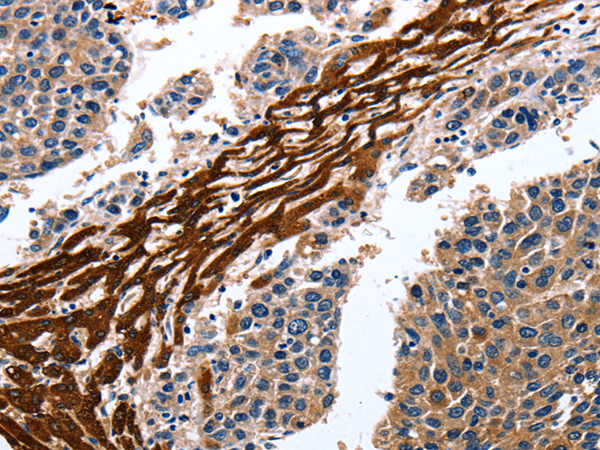

| WB | 咨询技术 | Human,Mouse,Rat |
| IF | 咨询技术 | Human,Mouse,Rat |
| IHC | 1/50-1/200 | Human,Mouse,Rat |
| ICC | 技术咨询 | Human,Mouse,Rat |
| FCM | 咨询技术 | Human,Mouse,Rat |
| Elisa | 1/1000-1/2000 | Human,Mouse,Rat |
| Aliases | HLP; CP33; CP34; CYP3A; NF-25; CYP3A3; P450C3; CYPIIIA3; CYPIIIA4; P450PCN1 |
| WB Predicted band size | 57 kDa |
| Host/Isotype | Rabbit IgG |
| Antibody Type | Primary antibody |
| Storage | Store at 4°C short term. Aliquot and store at -20°C long term. Avoid freeze/thaw cycles. |
| Species Reactivity | Human |
| Immunogen | Fusion protein of human CYP3A4 |
| Formulation | Purified antibody in PBS with 0.05% sodium azide and 50% glycerol. |
+ +
以下是3篇关于CYP3A4抗体的参考文献(示例格式,部分信息可能需核实):
---
1. **文献名称**: "Development and characterization of a highly specific monoclonal antibody against human CYP3A4"
**作者**: Smith J, et al.
**摘要**: 本研究开发了一种针对人CYP3A4酶的单克隆抗体,通过Western blot和免疫组化验证其特异性,成功应用于肝组织中CYP3A4的蛋白表达定量分析,为药物代谢研究提供工具。
2. **文献名称**: "CYP3A4 antibody-based detection of enzyme induction in primary hepatocytes"
**作者**: Lee S, et al.
**摘要**: 利用CYP3A4特异性抗体评估原代肝细胞中酶诱导水平,证明其在药物相互作用研究中的有效性,抗体灵敏度高且与CYP3A5无交叉反应。
3. **文献名称**: "Immunohistochemical localization of CYP3A4 in human tissues using a novel peptide-derived antibody"
**作者**: Zhang Y, et al.
**摘要**: 报道了一种基于合成肽段的新型多克隆抗体,通过免疫组化定位CYP3A4在肠、肝等组织的分布,揭示其与个体化用药相关的表达差异。
---
如需具体文献,建议通过PubMed或SciFinder检索关键词“CYP3A4 antibody”并筛选应用类研究。
**Background of CYP3A4 Antibodies**
CYP3A4. a member of the cytochrome P450 superfamily, is a critical enzyme involved in the metabolism of approximately 50% of clinically used drugs, as well as endogenous compounds and toxins. It is predominantly expressed in the liver and small intestine, where it plays a central role in phase I drug metabolism. Antibodies targeting CYP3A4 are essential tools for studying its expression, regulation, and activity in various biological systems.
These antibodies are typically developed using immunogenic peptides or recombinant proteins corresponding to specific epitopes of the CYP3A4 enzyme. They enable the detection and quantification of CYP3A4 protein levels in tissues (e.g., liver biopsies) or cell cultures via techniques like Western blotting, immunohistochemistry (IHC), and enzyme-linked immunosorbent assays (ELISA). Researchers also use CYP3A4 antibodies to investigate interindividual variability in drug metabolism, which can arise from genetic polymorphisms, drug-drug interactions, or disease states.
CYP3A4 antibodies are crucial in pharmacogenomics and toxicology studies, aiding in the assessment of enzyme induction or inhibition by xenobiotics. For example, they help identify how substances like rifampicin (inducer) or ketoconazole (inhibitor) modulate CYP3A4 expression. Additionally, these antibodies support the development of personalized medicine by correlating enzyme levels with metabolic phenotypes. Challenges in their application include ensuring specificity, as CYP3A4 shares structural homology with other CYP3A isoforms (e.g., CYP3A5). Recent advancements focus on generating monoclonal antibodies with higher selectivity and optimizing protocols for diverse sample types, enhancing their reliability in both research and clinical settings.
×